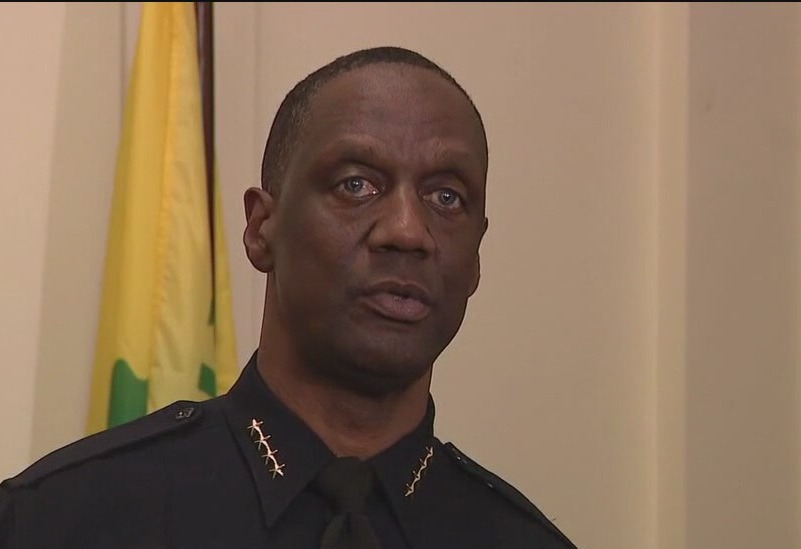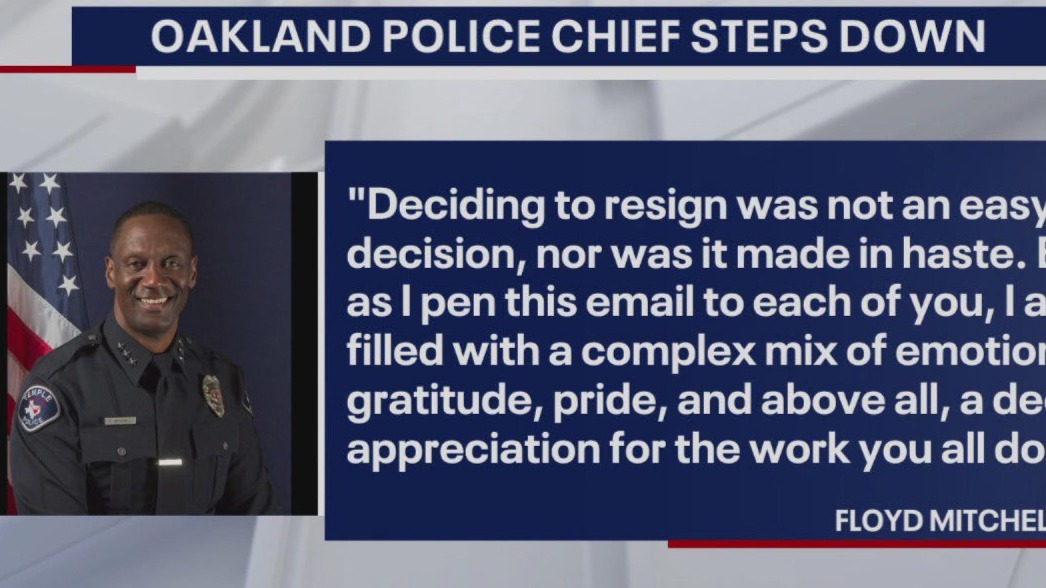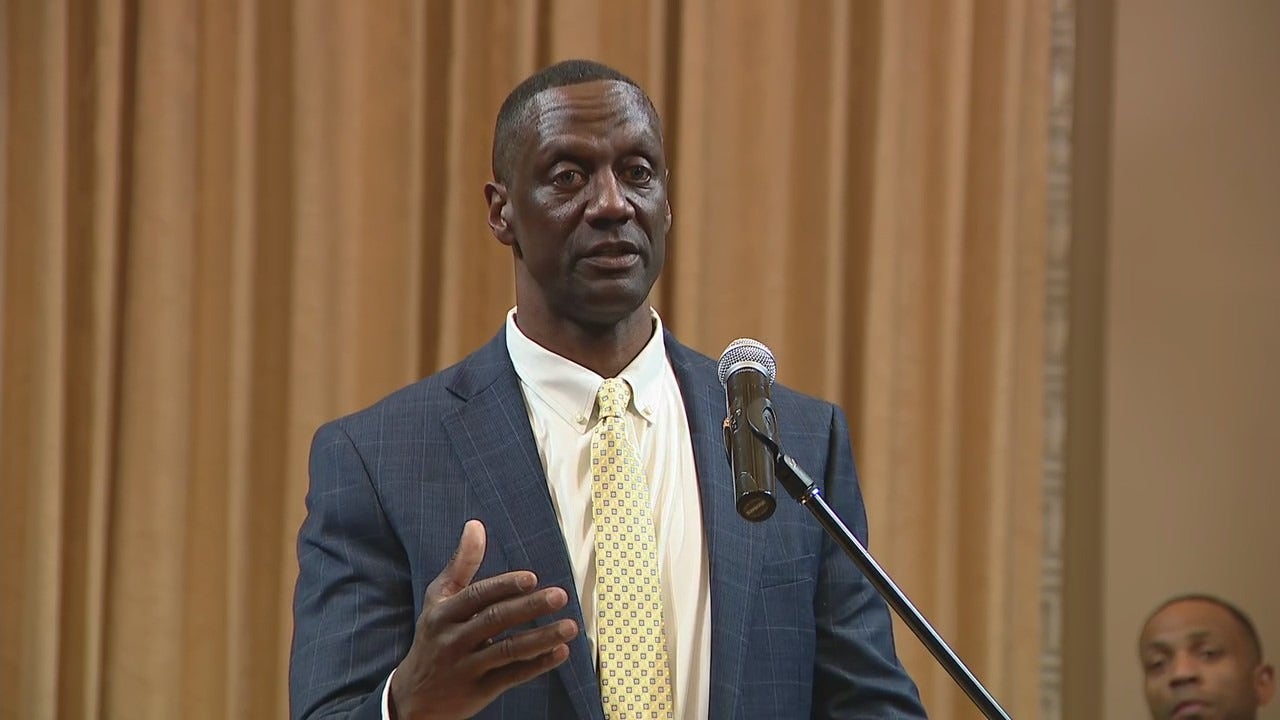
OAKLAND, Calif. – Oakland Police Chief Floyd Mitchell announced on Wednesday he is resigning slightly more than a year after being hired.
OPD chief’s resignation
Mitchell will step down on Dec. 5. He is Oakland’s 11th chief, or acting chief, since 2013.
“Deciding to resign was not an easy decision, nor was it made in haste,” Mitchell said in a statement. “Even as I pen this email to each of you, I am filled with a complex mix of emotions—gratitude, pride, and, above all, a deep appreciation for the work you all do.
Mayor Barbara Lee, in a statement, thanked Mitchell for his “dedicated service” over these last 18 months.
She noted that under his leadership, which began in May 2024, there have been “significant reductions in crime.”
Timeline: History of Oakland police chiefs
Oakland has had many police chiefs over the year, in part to scandals, and in part, due to the department’s cumbersome bureaucracy, including federal oversight and a powerful, civilian-led police commission. Here is a timeline of some of the incidents that have caused instability in the department:
Reasons not publicly stated
Why he was leaving was not made public.
But Justin Berton, who used to work for Oakland Mayor Libby Schaaf and who is now a communications consultant, said the job of Oakland police chief is an “impossible one,” with multiple bosses and “any one of them can fire you at any time.”
He guessed that since crime is down, Mitchell wanted to get out when the “going is good,” and not be fired himself, which can often be a “career killer.”
Berton noted that this was a good opportunity for Lee to bring in her own chief.

In fact, one source told KTVU the chief was “not very responsive” to the mayor and made decisions independently.
Other sources pointed to the cumbersome bureaucracy Mitchell, and any chief, has to deal with in Oakland, including the 20-plus year federal oversight over the department and the powerful, civilian-led Oakland Police Commission.
“I don’t think he wanted to be a chief in California,” said civil rights attorney Jim Chanin, who regularly dealt with Mitchell in the ongoing federal oversight agreement. “He seemed to be unhappy here.”
Unhappy with oversight
For example, in September 2024, a federal judge told Mitchell that OPD’s Internal Affairs division must report directly to him, which he responded would pretty much take up all of his time. To get out from under the oversight, OPD has to meet 50 reforms. To date, OPD has met 47 of them.
And in July, Mitchell blamed a 2023 ransomware attack on the city’s computer systems as the reason to blame for IA cases not being completed in a timely manner – a reason that a judge wasn’t really swayed by.
He did, however, score a compromise with the police commission. Last month, the commission voted to loosen up some, but not all, aspects of the police pursuit policy, which came after months of heated debate.
Still, Rashidah Grinage, who co-founded the Coalition for Police Accountability, which put the police commission into power, said that there has been “tension in the oversight community,” especially with Mitchell’s candor, where he told commissioners that police officers are fearful of being disciplined, making them apprehensive about doing their jobs.
Berton said the big question is who will be the next chief to free OPD from this oversight; both insiders and outsiders have failed at the job.
Oakland police union
Sgt. Huy Nguyen, president of the Oakland police union, said rank-and-file officers are “questioning whether certain anti-law enforcement factions of the community were ready or open to his honesty, dedication, and support of public safety.”
Nguyen was not specific about whom these “factions” were, but he did say simply: The Oakland Police Officers Association “is deeply concerned by Chief Mitchell’s resignation.”
“His departure represents another chapter in a troubling pattern of instability at the highest levels of city government and the Oakland Police Department,” Nguyen said. “Oakland deserves better. Our police officers deserve steady leadership. And, our residents and businesses deserve a city government that is focused on solutions to keep them safe.”
Nguyen said the union calls on the mayor and the city council to “confront the dysfunction that has crippled the effectiveness of OPD for years.”
Former Police Chief Anne Kirkpatrick, who was fired by Schaaf in 2020 and then won a battle to receive $1.5 million after a federal jury ruled she was wrongfully terminated, concurred with that dysfunction.
“Everybody screams and yells and hollers,” Kirkpatrick said from her new home in New Orleans, where she is police superintendent. “It’s the most dysfunctional leadership I’ve ever experienced and yet the department is fabulous and the city is fabulous.”
Her advice to a new chief? “Anticipate being fired. Don’t go unless you can afford to be fired.”
 Hiring Mitchell wasn’t easy
Hiring Mitchell wasn’t easy
OPD said that Mitchell will work with Lee and City Administrator Jestin Johnson to identify an interim chief of police until a new one can be hired.
Hiring Mitchell, who came from Lubbock, Texas, where he was chief, was not an easy task.
He was ousted-Mayor Sheng Thao’s final pick for chief after a yearlong search to replace LeRonne Armstrong, whom she fired in February 2023 after independent investigators said he didn’t properly handle misconduct cases within the police department.
But that choice came after Thao had rejected three names of candidates the Oakland Police Commission had sent her previously after more than a year of a vacancy for the post.
In an email sent through PR consultant Sam Singer, Armstrong thanked Mitchell for his service, adding that he hopes “public safety gets better in our beloved community and city.”
Mitchell’s employment contract with Oakland was for three years at an annual salary of $365,000.

